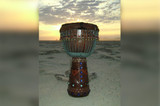National Music Day: What Does Rhythm Mean to You?
The rhythm swells as the orchestra’s frenzy reaches top impact, and you find yourself utterly entranced by the pounding of the timpani drums, the crash of the cymbals and the entire experience of being embraced by music. There is music, there is good music, and then there is music that is life-changing, and much of that experience is derived from the rhythm. As we begin to look toward National Music Day on June 21, the most important question we can think to ask any drummer or percussionist is simply, “what does rhythm mean to you?”
For a composer, rhythm could be the essential guide to helping audiences connect with the music as it plays. A masterful illustration that becomes notes, bars, rests and crescendos, allowing each section its own space while keeping the entire performance engaging though tempo and timbre for audience and musicians, alike.
For a musician, performer or instrumentalist, rhythm could be the pauses and soft, reflective beats that allow a guitar, flute or piano to melodically shine. The rhythm is the pulse that interlocks and weaves its way into the fingers and breath of the musician, uniting the spirit of a language that has no one home, yet, lives within us all.
For the audience, rhythm could be the channel to participate in the notes and beats played. Rhythm gives everyone the chance, with or without an instrument, to be inside the music; to better understand the lyrics, empathize with the strings and horns, or appreciate the improvisational, yet, consistent foundation that percussion instruments inspire.
For the drummer, rhythm is all of these things, and so much more. Drummers and percussionists not only play the beat, they must feel the beat, and for each individual drummer, the meaning of rhythm is different… and always changing. Rhythm is at the core of us all, yet, is one of the most expressive devices we have – whether in the audience, dancing with friends, composing a song, or drilling our rudiments. Without rhythm, there could not be music… yet, without music, there is still rhythm.
In celebration of National Music Day on June 21st, we want to know: what does rhythm mean to you?
Recent Posts
-
What is the Best Size Djembe for Beginners?
If you're new to the world of percussion and interested in learning the djembe, you're in for a t …16th Jul 2024 -
The Benefits of Becoming a Drumming Teacher: Transforming Passion into Profession
Why become a drumming teacher? Becoming a drumming teacher is an excellent way to share your pas …22nd May 2024 -
What Makes the Djembe Drum a Spiritual Instrument in African Music?
Origin and history of the Djembe drum The Djembe drum originates from West Africa and holds sign …16th May 2024



